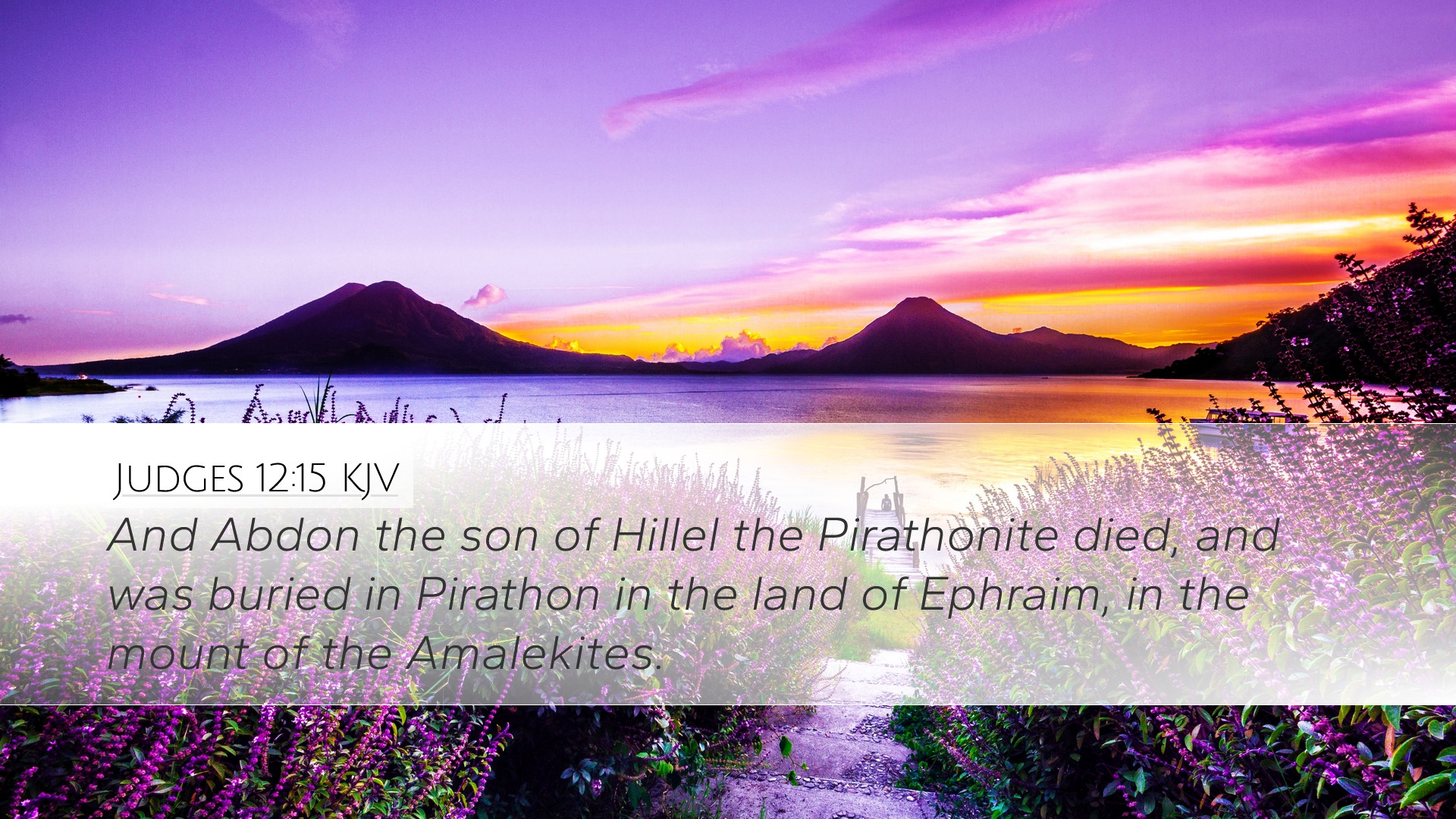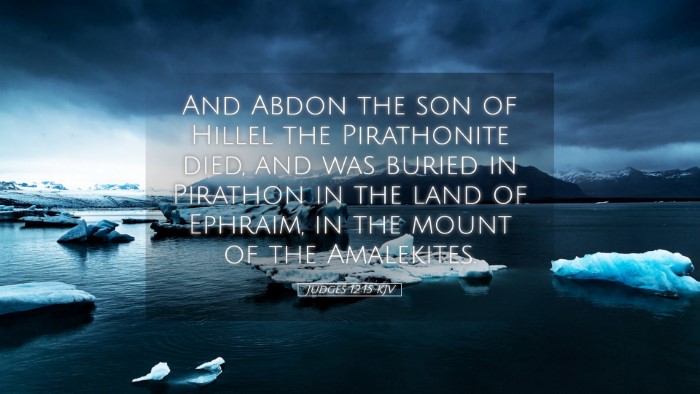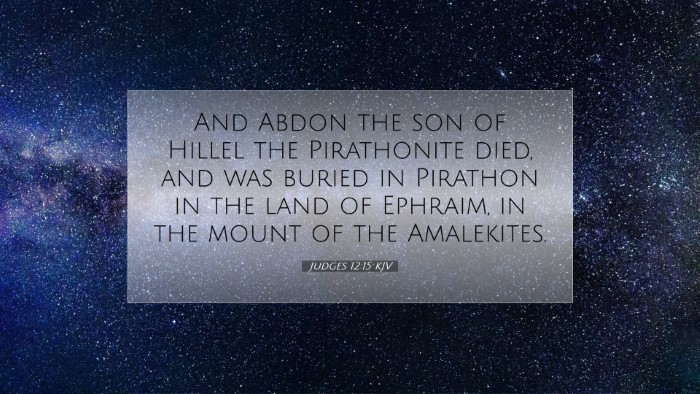Old Testament
Genesis Exodus Leviticus Numbers Deuteronomy Joshua Judges Ruth 1 Samuel 2 Samuel 1 Kings 2 Kings 1 Chronicles 2 Chronicles Ezra Nehemiah Esther Job Psalms Proverbs Ecclesiastes Song of Solomon Isaiah Jeremiah Lamentations Ezekiel Daniel Hosea Joel Amos Obadiah Jonah Micah Nahum Habakkuk Zephaniah Haggai Zechariah MalachiJudges 12:15
Judges 12:15 KJV
And Abdon the son of Hillel the Pirathonite died, and was buried in Pirathon in the land of Ephraim, in the mount of the Amalekites.
Judges 12:15 Bible Commentary
Judges 12:15 Commentary
Verse: Judges 12:15 - "And Abdon the son of Hillel the Pirathonite died, and was buried in Pirathon in the land of Ephraim, in the mount of the Amalekites."
Introduction
The closing verses of the Book of Judges often serve to summarize the lives of lesser-known judges, providing insight into their contributions and the historical context within which they operated. Judges 12:15 details the death and burial of Abdon, a judge of Israel, reminding us of the transient nature of leadership and the enduring legacy of faithfulness.
Historical Context
The Book of Judges chronicles a tumultuous period in Israel's history, characterized by cycles of sin, oppression, repentance, and deliverance. Abdon, son of Hillel, follows in the footsteps of other judges, exemplifying the human element in divine governance. This passage anchors itself within the geography of Ephraim, a central location that underscores the interplay of tribal dynamics and leadership.
Insights from Commentaries
Matthew Henry's Commentary
Matthew Henry emphasizes the brevity of Abdon’s reign compared to the broader narrative of the judges. He notes that Abdon's tenure may have been peaceful, marked by prosperity, as there is no record of oppression during his time. Henry draws attention to the simplicity of the mention of his death and burial, highlighting that the details of one's life and service to God are more critical than the tenure in power.
Albert Barnes' Notes
Albert Barnes elaborates on the significance of the location of Abdon's burial. Pirathon, his birthplace, symbolizes the connection to the land of Ephraim, which was a central region in Israel. Barnes deduces that this emphasizes how God raises leaders from among the people and cares for them even in death. He also reflects on the notion that leadership in Israel was deeply communal and tied to the land, a characteristic that would resonate with the audience familiar with the geography of Israel.
Adam Clarke's Commentary
Adam Clarke provides a nuanced view of Abdon's lineage, noting that he is referred to as the son of Hillel the Pirathonite, which may suggest a rich heritage linked with the city of Pirathon. Clarke offers a spiritual reflection on the nature of judgeship, asserting that every leader has a legacy shaped by their fidelity to God’s covenant. His commentary draws attention to how Abdon's life should inspire contemporary readers to evaluate their devotion and service, irrespective of their public acclaim.
Theological Implications
This verse presents several theological insights relevant to pastors, students, and scholars:
- The Impermanence of Leadership: The detail of Abdon's death serves as a reminder that earthly leadership is fleeting. It calls for humility among leaders, acknowledging that their role, while significant, is temporary and ultimately subordinate to God's eternal plan.
- The Importance of Legacy: The simple mention of burial traditions in Ephraim reflects a greater theme of leaving a legacy. Leaders should always strive for a legacy rooted in faithfulness and service to God’s people.
- The Community Connection: Abdon’s connection to Pirathon indicates that leaders emerge from the community they serve. This highlights the importance of local congregations and communities in raising up leaders who are truly representative of their people.
- Divine Sovereignty in Leadership: The account indicates that although certain judges operated in varied contexts, the overarching narrative of God’s sovereignty remains. Each judge serves as part of God’s redemptive plan for Israel, reinforcing that leadership is divinely orchestrated.
Practical Applications
For modern leaders and congregations, Judges 12:15 offers poignant lessons:
- Fostering Humility: Leaders should cultivate humility, recognizing their role as stewards of God’s flock rather than as ultimate authorities.
- Pursuing Faithfulness: Encouraging congregations to commit to faithfulness in their communities mirrors the legacy of Abdon, illustrating that physical location matters in God’s plan.
- Understanding Leadership’s Role: Examine the qualities that make a good leader by studying those mentioned in scripture, and implement training within church governance.
- Building Community: Leaders should actively engage in their communities, promoting unity and investing in the next generation of leaders.
Conclusion
Judges 12:15, while succinct, encapsulates profound truths about leadership, legacy, and the importance of community. The reflections gathered from public domain commentaries provide a rich tapestry of insights that encourage readers to delve deeper into the narrative of the judges. By contemplating the life of Abdon, contemporary leaders and scholars are urged to align their leadership with the values of humility, faithfulness, and community engagement as they participate in God’s ongoing story.


